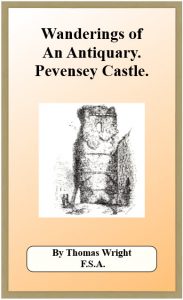THE coast districts of Sussex were rendered important in ancient times by their productions, as well as by their position, which was favourable for communication with Gaul. They were separated from the rest of the island by a wide belt of very thick forest extending from Kent westward into Hampshire, known to the Romans by the name of Silva Anderidce, and to the Saxons by that of Andredes-weald and Andredes-leah. This name it either took from, or gave to, an important town on the coast named Anderida or Portus Anderidse fortified place, and its townsmen brave
We have no notice in the Roman writers of the history of this town, further than that its name is entered in the Itineraries. When the Saxon invaders landed in AD. 477, under their leader Ælla, and his three sons Cymen, Wlencing, and Cissa, they found this town, which they called Andredes-ceaster, a very strongly fortified place and its townsmen brave and skilful warriors. It was not till 491, fourteen years after their arrival, that Ælla and his son Cissa obtained possession of it, and then they were so incensed at the long and obstinate defence of its inhabitants, that they slew all that dwelt therein, so that not a single Briton was there left. Such is the account given by the Anglo-Saxon chronicle.
The wars of Ælla and the fate of the Roman Anderida appear to have been long celebrated in Saxon song, for the old historian Henry of Huntingdon, who made great use of such popular materials, has given us from tradition a more circumstantial account of the attack upon this important town. He tells us that Ælla led a very large force to the siege of this well-fortified town (urbem munitissimam). The Britons assembled “like bees,” and harassed the besiegers by day and by night but the more the Saxons suffered from their attacks the fiercer they became, and they made continual but unavailing efforts to force their way into the place. But whenever they made their assaults on the walls, the Britons attacked them behind with arrows and darts so hotly, that they left the walls, and turned upon them.
